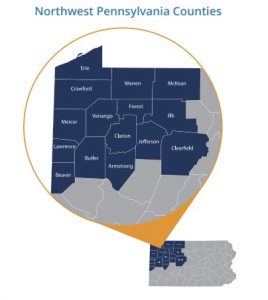Transition Assistance Programs’ (TAP) Relationship with Post-Military Separation Life Outcomes

The Northwest Pennsylvania (NW PA) Veteran Suicide Prevention Program operates on a three-pronged approach involving healthcare providers, community organizations, and Veterans and their families in the 15 counties of NW PA. Our Vision is that the work of this Program will result in resident Veteran suicides being reduced to zero by the end of the project period (August 31, 2025).
This article summarizes the research article Post-Separation Transition Assistance Program (TAP) Assessment (PSTAP): 2019 Cross-Sectional Report U.S. Department of Veterans Affairs as presented by graduate student assistant Samantha Hernandez. The following topics are explored:
- Veterans’ experiences with TAP
- Veterans’ benefits usage
- Challenges facing Veterans during transition
- Employment outcomes
- Veterans’ satisfaction with life
Read time: 5 minutes
A pdf of the presentation, including sources, is available for download.
 TAP: An Upstream Approach to Suicide Prevention
TAP: An Upstream Approach to Suicide Prevention
Based on results from the U.S. Department of Veterans Affairs’ (VA) Veterans of Foreign Wars survey, only 60% of transitioning service members report participating in a Transition Assistance Program (TAP). In the the published research article Post-Separation Transition Assistance Program (TAP) Assessment (PSTAP): 2019 Cross-Sectional Report U.S. Department of Veterans Affairs (VA), the researchers sought to identify what is most important to Veterans in determining their satisfaction with TAP, determine what to do to improve the experience; and guide training and activities aimed at enhancing the quality of benefits and services for Veterans. As the highest suicide rates are within one year of transition from active duty, increasing participation in TAP is viewed as an upstream approach to suicide prevention and a mechanism for fostering community and protective factors.
Post-Separation Servicemember Cohorts
The study involved three cohorts:
- Cohort 1: Servicemembers who separated 5-6 months (Dec. 2018/Jan. 2019) prior to completing the 2019 survey
- Cohort 2: Servicemembers who separated 11-12 months (June/July 2018) prior to completing the 2019 survey
- Cohort 3: Servicemembers who separated 35-36 months (June/July 2016) prior to completing the 2019 survey
TAP: Survey Findings
 VA benefits are important to nearly all Veterans because they help Veterans’ capacity to overcome obstacles related to any type of employment. One finding of note is that TAP usage is higher for Veterans in Cohort 3, as they have spent more years in civilian life compared to other cohorts. However, Veterans from all cohorts who took TAP encountered a wide array of challenges when transitioning from military to civilian life, including those in Cohort 3. In addition, Veterans who took TAP are more likely to work in full-time, permanent positions and for Cohort 3 had the highest percentage of engagement in entrepreneurial activities.
VA benefits are important to nearly all Veterans because they help Veterans’ capacity to overcome obstacles related to any type of employment. One finding of note is that TAP usage is higher for Veterans in Cohort 3, as they have spent more years in civilian life compared to other cohorts. However, Veterans from all cohorts who took TAP encountered a wide array of challenges when transitioning from military to civilian life, including those in Cohort 3. In addition, Veterans who took TAP are more likely to work in full-time, permanent positions and for Cohort 3 had the highest percentage of engagement in entrepreneurial activities.
Additional survey findings included:
- Members of all three cohorts felt that the VA briefings were the most useful courses (about 85% useful).
- Servicemembers use their VA benefits at a higher rate than the general study population.
- Members of all three cohorts had a higher likelihood of using VA benefits and show more positive outcomes than the general study population.
- Servicemembers who used TAP have high levels of satisfaction (about 60%) with most aspects of their lives, including their future security.
TAP: Areas for Improvement
 Servicemembers within the three cohorts who participated in the survey indicated the following areas for improvement:
Servicemembers within the three cohorts who participated in the survey indicated the following areas for improvement:
1. Improve TAP curriculum regarding the most significant challenges Veterans face during their transition
2. Focus additional resources on those in lower pay grades
3. Improve the Transition Goals, Plans, Success (Transition GPS) curriculum by focusing on courses that received a low usefulness score
4. Identify TAP courses that can be optional for officers and Veterans in higher pay grades
In addition, the following areas have been identified by the VA as benefiting from improvement:
1. Develop better messaging to ensure Veterans are aware of one-on-one counseling services provided by the VA
2. Provide additional mental and emotional health services to transitioning servicemembers and also to Veterans immediately after transition
3. Improve Veterans’ understanding of available family benefits
Share Our Vision and Get Involved
Whether you identify as a healthcare provider, community organization, or Veteran, there are several opportunities through the NW PA Veteran Suicide Prevention Program and PERU to connect to resources, participate in educational training, and promote harm reduction strategies. We are actively recruiting healthcare and community partners to work with us in meeting our goals and objectives. To learn more, visit the program website at theresilientveteran.org.
Need Help? Know Someone Who Does? Contact the National Suicide Prevention Lifeline at 988 or use the online Lifeline Crisis Chat. Both are free and confidential. You’ll be connected to a skilled, trained counselor in your area.

